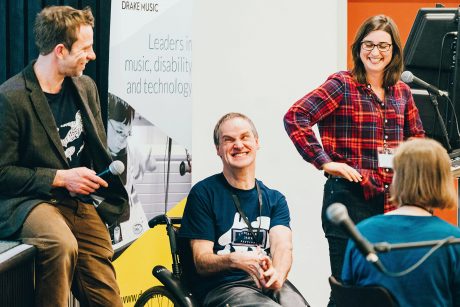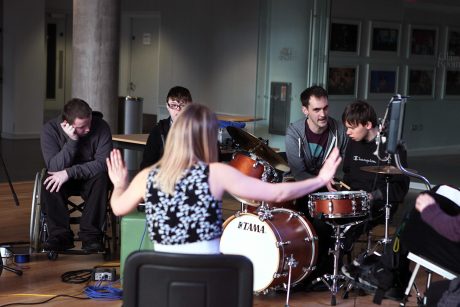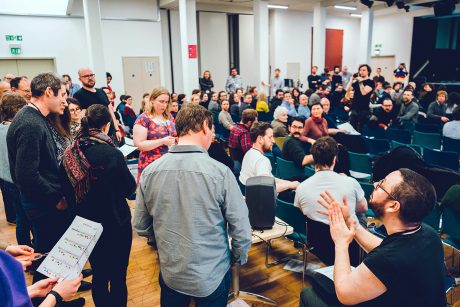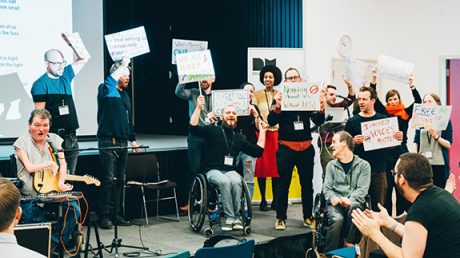In it together: Hub Partner Member Drake Music considers the importance, and potential, of partnership
14th September 2018
Partnership is at the heart of what a Music Education Hub is, and supporting these partnerships is central to Music Mark’s mission. It can take time to build a good partnership, trusting and respecting each other’s ways of working, and coming together in a cooperative, collaborative or confederated* way to deliver music education opportunities for young people. As Music Mark relaunches its Hub Partner Membership, seeking to grow, broaden and diversify its voice within the sector, we take a closer look at the inspiring examples of collective work happening across the country, of organisations we are proud to call Music Mark Members. In this first instalment, we shine the spotlight on Drake Music.

Steve Varden at WAMM
Music Mark: What does your organisation do and who does it serve?
Drake Music: Drake Music is one of the leading organisations working at the intersection of music, disability and technology. Non-disabled people can make music in many ways. We want the same for disabled people. We want equal opportunities for everyone to make music. Our vision is a world where disabled people have the same range of opportunities, instruments and encouragement, where disabled and non-disabled musicians work together as equals.
We have been pioneering the use of assistive music technology for over 20 years and we work closely with disabled musicians and technologists to build new accessible instruments. In that time, we have also developed lots of imaginative methods of teaching and delivering inclusive music education sessions. We work with musicians of all ages, from schoolchildren making their first foray into music, to professional musicians writing and performing new commissions in world-class venues. We also work with the music education sector to offer training & consultancy in developing inclusive practice and advocate for equal rights for disabled musicians. We believe that music is a human right and we work to break down disabling barriers to music in many different ways.
MM: Which Music Hub(s)/Service(s) are you in partnership with and where do you operate?
DM: We operate nationally, so we work in partnership with many different Music Hubs/Services, with different levels of engagement. We are also now part of the Alliance for a Musically Inclusive England, formerly called the Fund C group, funded by Youth Music. That is all about taking a strategic approach to supporting inclusive practice across the sector.

An inclusive ensemble
We have core partnership activity built into our Think22 programme with Essex, Coventry, Love Music Trust (East Cheshire) and THAMES (Tower Hamlets) and will also be working with Bristol Plays Music. We are also continuing to support Kent following on from our previous Fund C connection, this time working with their newly recruited “SEND” specialist, providing disability equality training for their team and his delivery practice.
We are also in a long-term partnership with Resonate in Liverpool to deliver the Young DaDa Ensemble, along with other partners. In London we have been co-delivering work in schools for Ealing and Newham Music, and will soon start co-delivering new bespoke instrument building sessions with Kent Music. We are also in the planning phase of a new partnership with North Lincolnshire.
In the first year of Think22 we are also working with organisations linked to a wide range of hubs across the country, including: NYMAZ, Nottingham, Milton Keynes, Hull, Tees Valley, Birmingham, Staffordshire, Cumbria and Hampshire and Oxford. We will be delivering a range of activity, including one-off training courses for teachers, hubs and schools.
We also regularly develop and share resources that support the music education workforce more widely. We aim to share our learning, to lead discussions, support change and be part of the development of a truly inclusive approach to music education. The following resources are all free to access and open to all.

We All Make Music jam
MM: What does the word “partnership” mean to you?
DM: Partnership to Drake Music means working together towards a common goal: genuinely inclusive music education. We work with our partners to find agreed common aims and goals that can be realised though collaborative activities. A good partnership means taking advantage of each organisation’s respective knowledge, skills and expertise, in order to achieve something that could not be achieved separately and which is mutually beneficial.
An example of our partnership approach is Soundbox, which is an inclusive ensemble which we run in partnership with Spitalfields Music, London Symphony Orchestra and Tower Hamlets Arts and Music Education Service. The group meet weekly during term times as part of the THAMES Saturday Music School and they compose and devise new pieces of music together with musicians from the LSO. It is a very collaborative process and has been a fantastic partnership for several years now. The young musicians get to work with professional musicians of an incredibly high calibre, to develop social and personal skills as well as musical expression, and the musicians from the LSO are challenged to work in a different setting and grow and stretch their improvisation and collaboration skills in new ways.
MM:How has your service/provision changed since you went into partnership with a Music Service? How do you think the partnered Music Service has changed?
DM: As an organisation we always aim to learn and grow and benefit from the different experiences and insights of our partners. As a result of our previous Fund C programme, Think2020, we are now more focused on workforce development for Hubs, Hub partners and stakeholder organisations. We are clearer now about how what we do connects with and supports their core and extension roles. We have also come to a deeper understanding that Hubs vary widely and there are many different approaches to how they deliver on their core and extension roles. In turn, there is no ‘one size fits all’ model for how we support them.
There are many hubs that have changed, but a good example is Kent where their wider approach to recruitment changed as a result of our consultancy with them on their new “SEND” role recruitment. We worked with their team to input into their recruitment process on this particular role and Kent then adopted the changes across the whole organisation, so that all of their recruitment is more accessible to disabled people now. This increases the likelihood that disabled people will apply, and be able to demonstrate their suitability for and ability to take up, roles in their team. This is a fantastic response from Kent and is a great step towards developing the diversity of their workforce.
MM: Who would you like to partner up with next?
DM:We are open to working with any hubs who are interested in what we do. We particularly would like to meet hubs that feel that they would like to develop practice, culture and understanding around working with disabled musicians at all levels of their organisation. We would also like to work with organisations who are putting an emphasis on partnership working and youth voice. We can adapt our ways of working to suit different sizes of organisation, so we would be interested to work with smaller organisations as well as the bigger hubs. There is a huge amount of good work going on across the sector and we’d love to help organisations to develop their workforce to be inclusive too.
MM: In your opinion, why is it important to be part of a national network such as Music Mark?
DM: There are tremendous benefits to being part of this network, not least the national reach. It offers a voice that is valued and listened to by hubs and the music education sector. This helps us, as a small organisation, to reach and share practice further, and to benefit in return from the expertise of the other members. Being part of a network gives us all a chance to develop together, to have a stronger voice and to open up access to music for all.

We All Make Music DM protest
* the three levels of partnership identified by past HMI Margaret Griffiths
Further reading and support from Drake Music:
GROUP: Inclusive Teachers and Music Leaders Facebook Group
GUIDE: The Short Guide to Accessible Music Education created with Drake Music Scotland & MEC
GUIDE: We All Make Music Guide – created in response to the Report we published on the underrepresentation of disabled people in the music education sector workforce. It shares our learning on ways to diversify the music ed workforce now and to support young disabled people to work in the sector in the future.
On our blog are many practical resources for teachers delivering music lessons, such as tips on the accessible iPad apps, setting up a classroom for an inclusive session, examples of call and response techniques and more.


